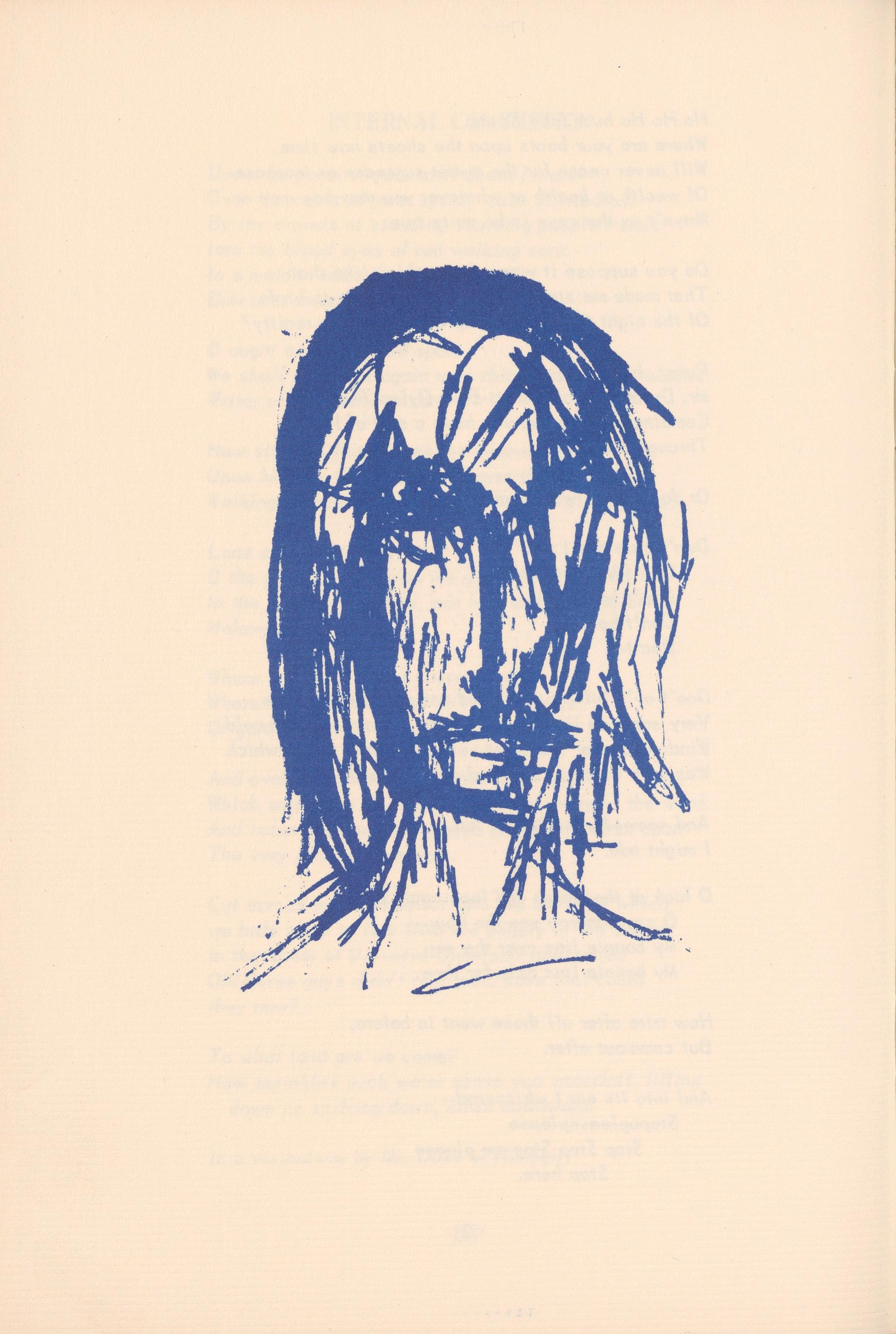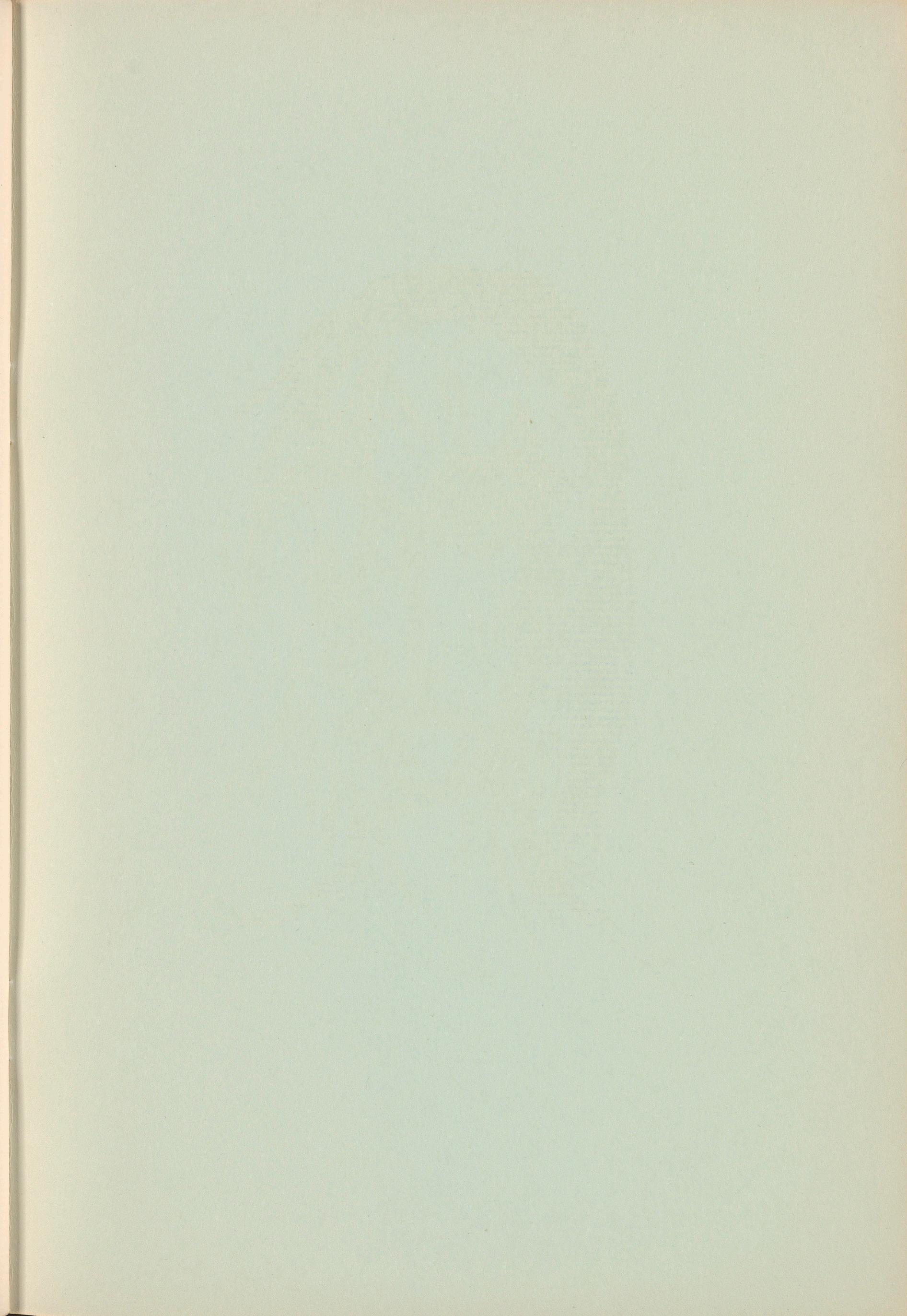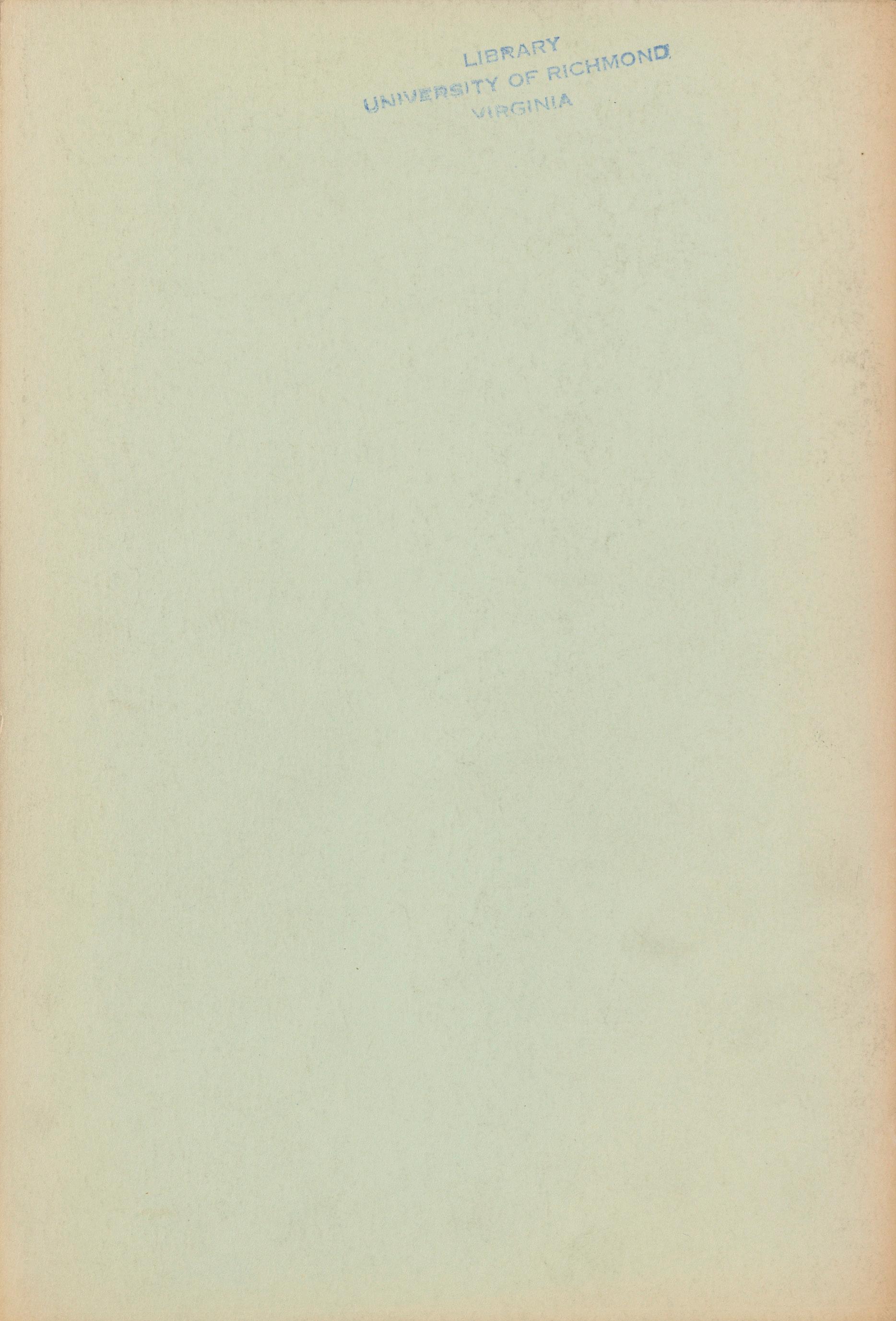






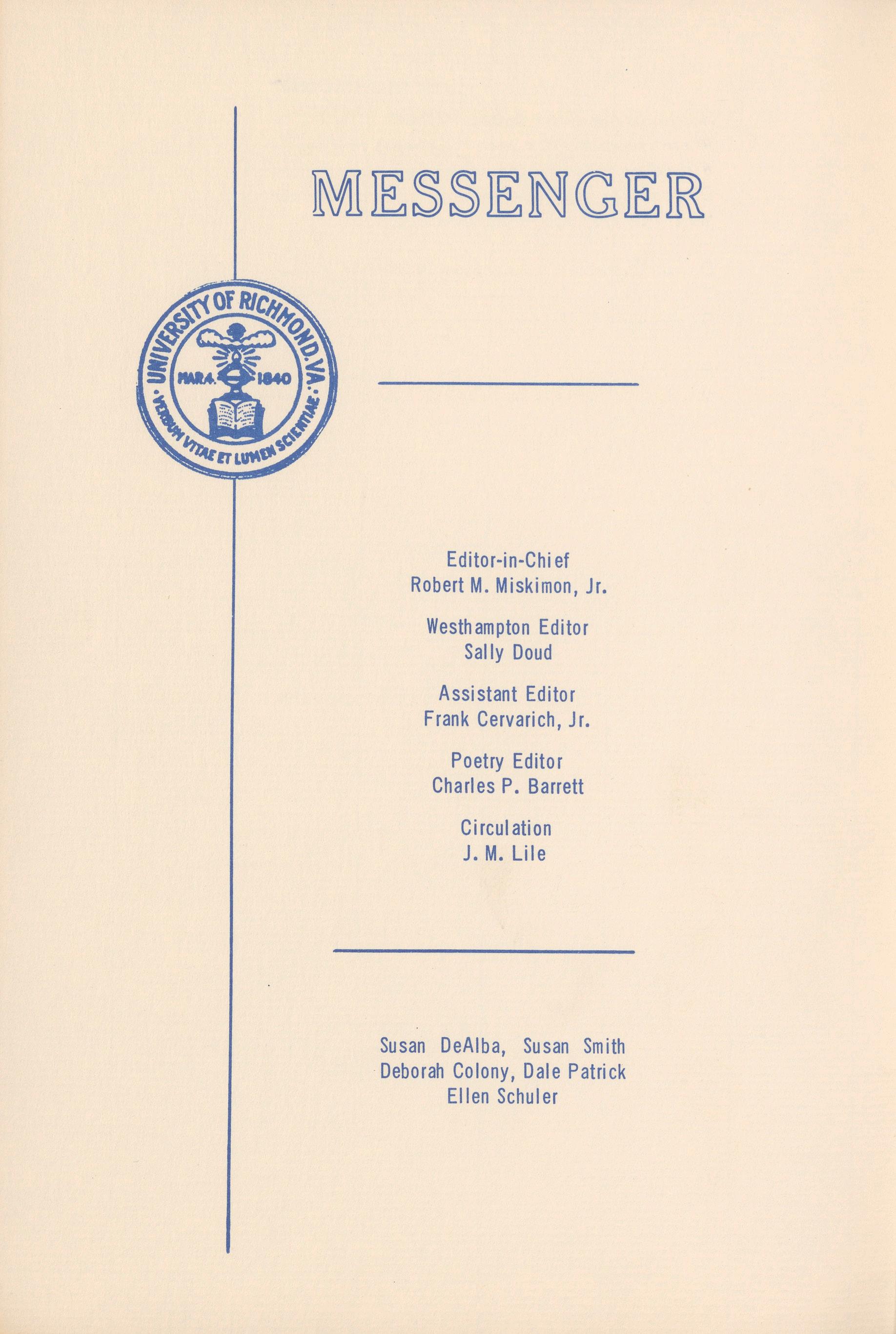
Editor-in-Chief
RobertM. Miskimon,Jr.
WesthamptonEditor Sally Doud
Assistant Editor FrankCervarich,Jr.
Poetry Editor CharlesP. Barrett
Circulation
J.M. Lile
Susan DeAlba, Susan Smith
DeborahColony,Dale Patrick Ellen Schuler
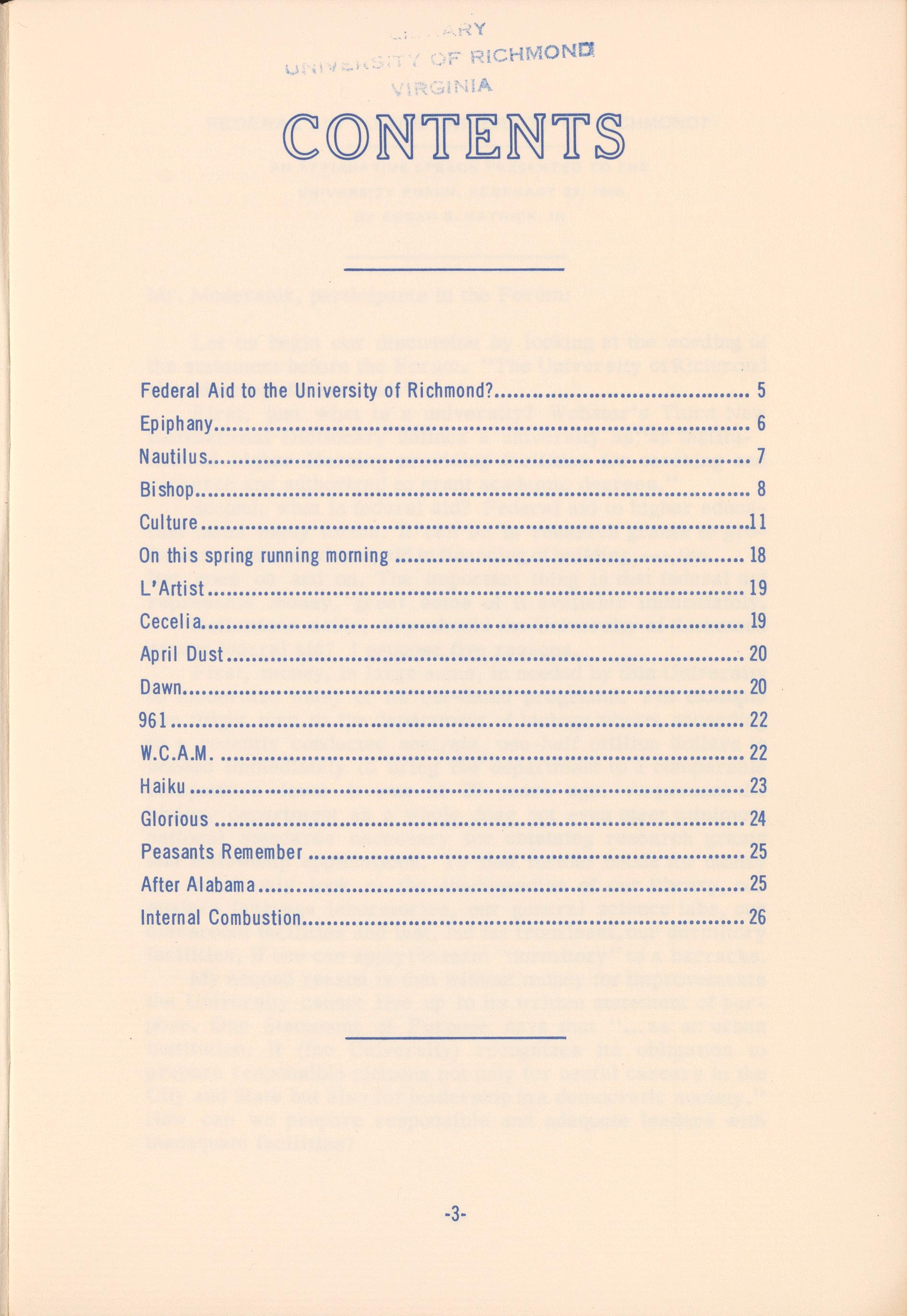

AN AFFIRMATIVE SPEECH PRESENTED TO THE UNIVERSITY FORUM, FEBRUARY 23, 1966
BY EDGAR B. HATRICK, Ill
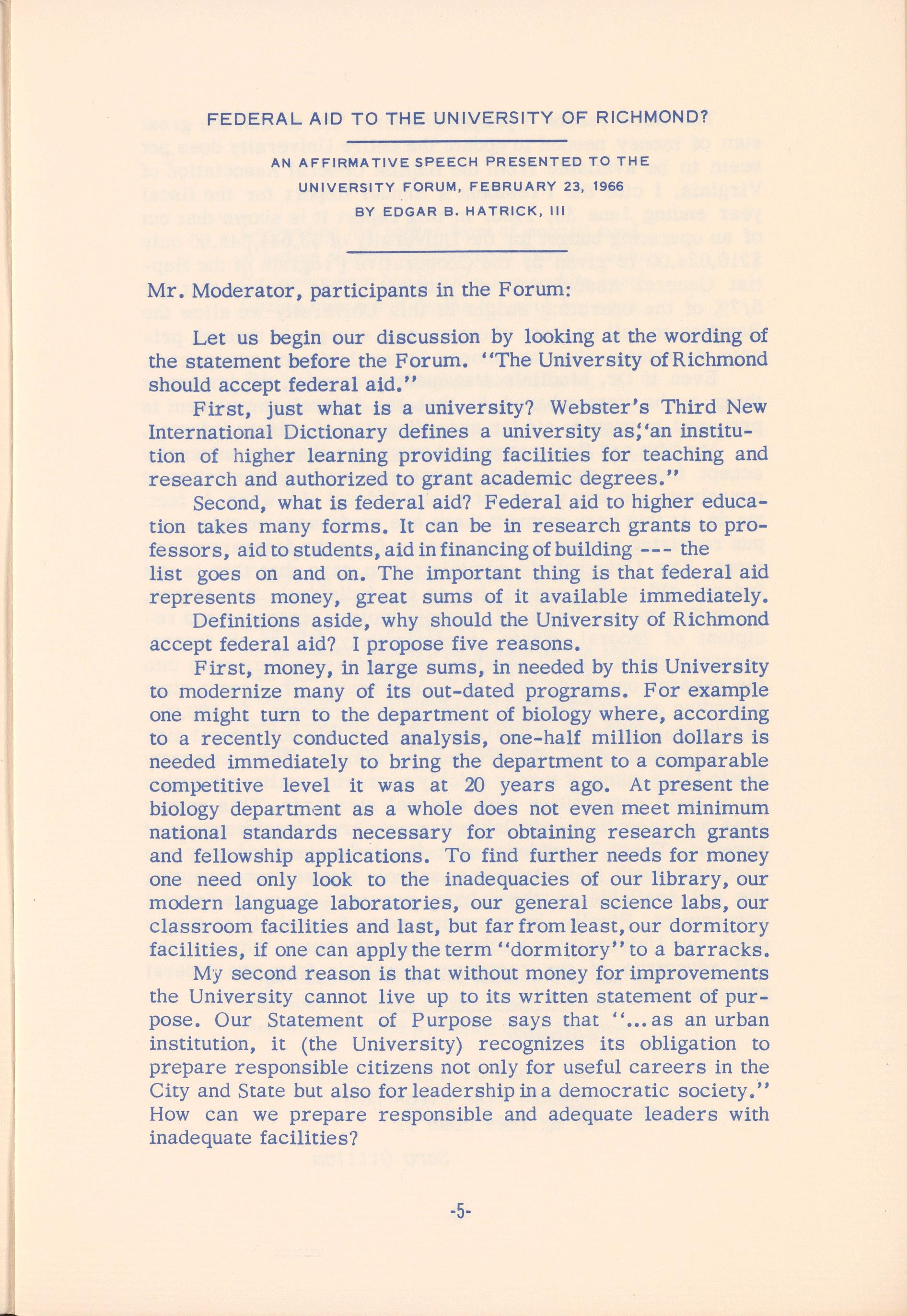
Mr. Moderator, participants in the Forum:
Let us begin our discussion by looking at the wording of the statement before the Forum. "The University of Richmond should accept federal aid."
First, just what is a university? Webster's Third New International Dictionary defines a university as;•an institution of higher learning providing facilities for teaching and research and authorized to grant academic degrees."
Second, what is federal aid? Federal aid to higher education takes many forms. It can be in research grants to professors, aid to students, aid in financing of building ---the list goes on and on. The important thing is that federal aid represents money, great sums of it available immediately.
Definitions aside, why should the University of Richmond accept federal aid? I propose five reasons.
First, money, in large sums, in needed by this University to modernize many of its out-dated programs. For example one might turn to the department of biology where, according to a recently conducted analysis, one-half million dollars is needed immediately to bring the department to a comparable competitive level it was at 20 years ago. At present the biology department as a whole does not even meet minimum national standards necessary for obtaining research grants and fellowship applications. To find further needs for money one need only look to the inadequacies of our library, our modern language laboratories, our general science labs, our classroom facilities and last, but far from least, our dormitory facilities, if one can apply the term "dormitory" to a barracks. My second reason is that without money for improvements the University cannot live up to its written statement of purpose. Our Statement of Purpose says that " ... as an urban institution, it (the University) recognizes its obligation to prepare responsible citizens not only for useful careers in the City and State but also for leadership in a democratic society." How can we prepare responsible and adequate leaders with inadequate facilities? -5-

The third reason I propose federal aid is that the great sum of money needed to update the entire University does not seem to be available from the Baptist General Association of Virginia. I cite the President's Annual Report for the fiscal year ending June 30, 1965. In this report it is shown that out of an operating budget for the University of $3,644,048.00 only $210,024.00 is given by the Cooperative Program of the Baptist General Association of Virginia. This means that for 5/7% of the operating budget of this University we allow the Baptists to tell us from whom we may accept aid through private donations when tax money is available to universities.
Even if Dr. Modlin' s statement is correct, the important thing to be remembered is that the federal government is prepared to provide aid far exceeding that of private industry.
My fifth and final reason for proposing that our university accept federal aid is that we are now making hypocrites of ourselves. We say we do not accept federal aid, when, in fact, we do. At this very moment there are professors on this campus receiving research grant moneys from the federal government. The University's administration says that this is not federal aid to the school, but to the individual. But, indeed, according to Dr. Willie M. Reams, biology professor and recipient of federal grants, approximately 20% of all federal research grant money received by professors here goes into the general operating fund of the university. Dr. Reams cites a pending grant of $13,000.00 that he is to receive. $3,500.00 of this grant is to go to this University. Is this not federal aid?
To summarize, the problem is simple. The University needs large sums of money quickly to provide quality education on a level competitive with national standards. This money does not seem to be available from our traditional sources of revenue. There is evidence that foundations and industry are becoming loath to contribute to schools that are .not accepting the aid available to them from expenses from the federal government. Finally, by accepting some federal aid as it now does, our University has acknowledged the need. Why not take full advantage of the resources available from the federal government?
epiphany
the grass at nine o'clock squeaks like clean hair as my toes comb it
Sara Gilliam
-6-
Contending the saffron frost of moonlit sand, A furtive shadow invades bold Triton's realm; He lowers from his lips the snow white conch, Gazing from turbid depths to watch her poss.
She is forever walking on these shores, A night-song whispered on on empty strand; Unfothom'd depths of mist sing out a prayer, And veiled eyes strain to trace in ebon shrouds A ship returning from the empty sea ...
A single beacon glares within the ether, T wink Ii ng forth a murmer from the waves, Calling voices back from time unknown; Singing of the fisherwives who wait In weathered shocks that huddle on the shore, And pearly treasures inlaid on the sand Echo strains of children's singing hearts, And creaking nets al I crusted stiff with brine Lament the hearts that dream beyond the reef.
Fluorescent lights now glow within the deep; A chambered nautilus, nature's vessel, glides And shatters on the merciless sea-crags, Scattering fragments of Letheon dreams ...
High tides will erase the footprints on the shore, Inscribed in sorrow on the sands of time; And fragile breath will blow away the foam.
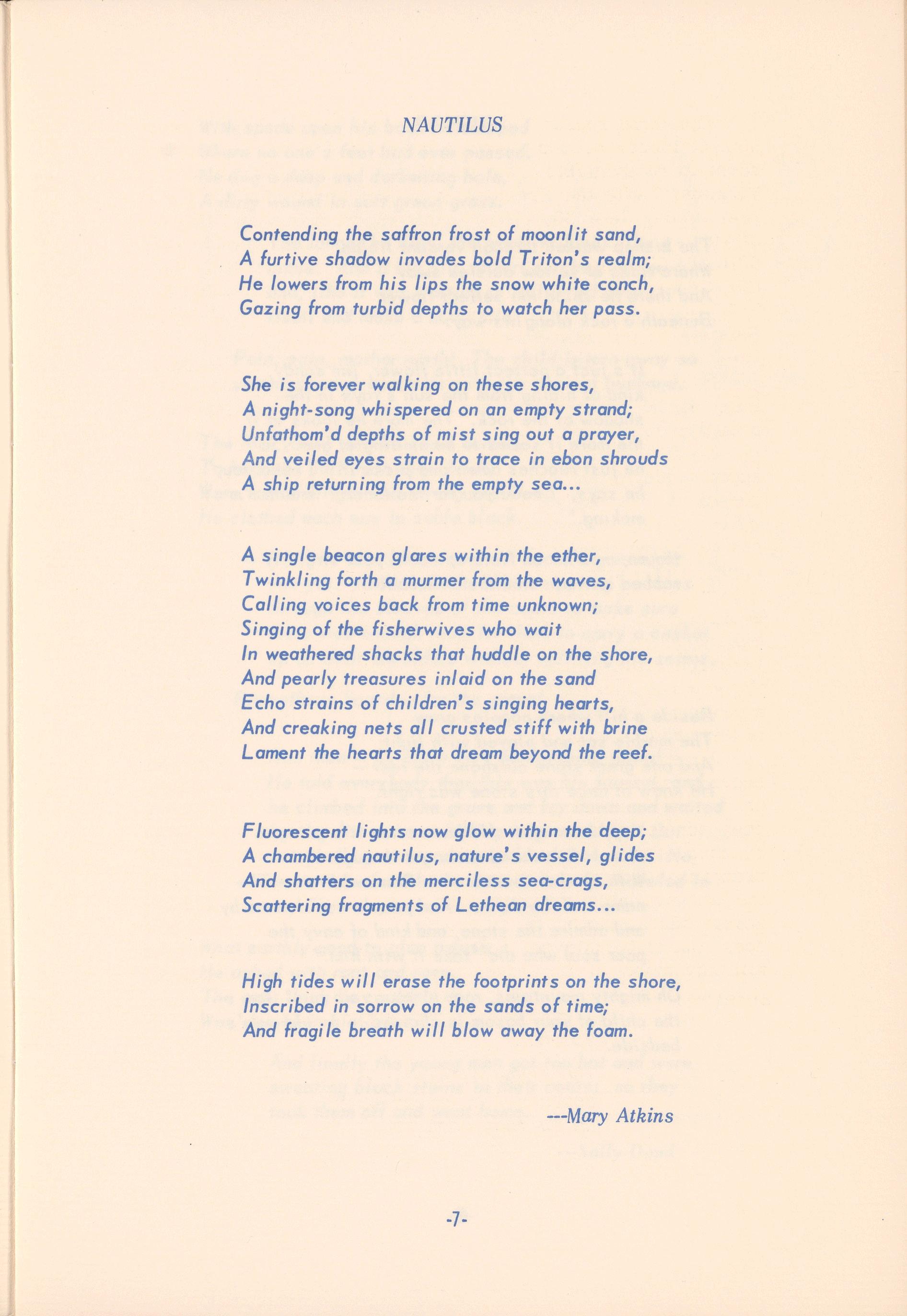
---Mary Atkins

The bishop walked through verdant fields Where tides of yellow daisies sway•· And there he spied the perfect flower Beneath a rock along his way.
It's ;ust a perfect little flower, iim dandy, kind of hiding from the sun's rays in the shadow of the rock. The more he looks at it, the more it seems to be smiling at him. So he ;ust reaches down and picks it. 'I need you,' he says, 'I need you for the funeral wreath I'm making.'
Mourn, mourn! oh Nature; mourn your virginity·· robbed to warm an old man's bed!
Beside a hill where poppies grew
The marble sat and played with light; And one great stone outshone the rest ·· He knew at once this stone was right.
Yep, iust right. He knows how it's going to shine when the chisels get through with it With a name in nice even Roman letters. The name and the dates. And people could come by and admire the stone, and kind of envy the poor soul who did "take it with him."
Oh mighty mountains, roar in your vain fury! for the child of your bosom is chained to an old man's bedside.
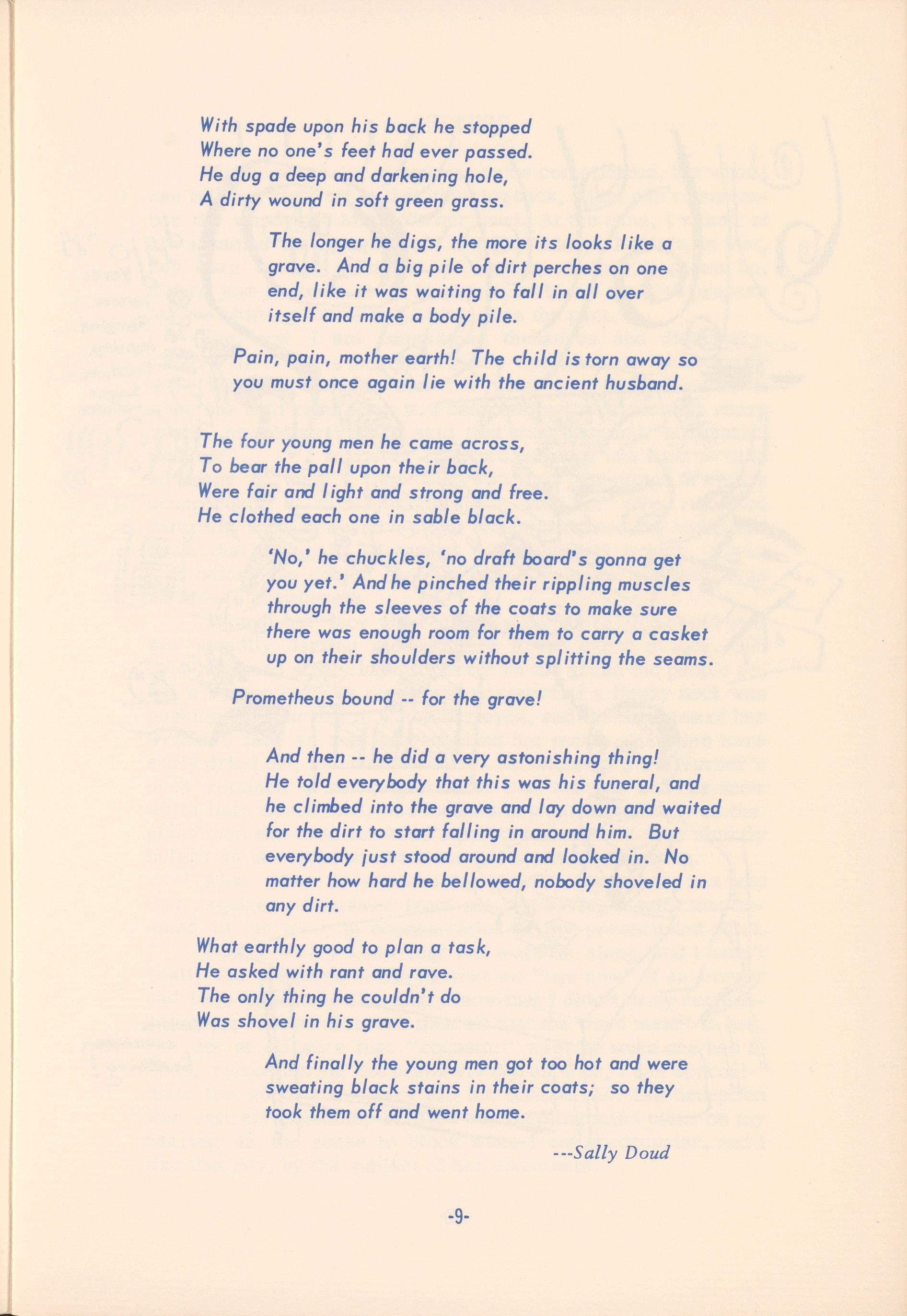
With spade upon his back he stopped Where no one's feet had ever passed. He dug a deep and darkening hole, A dirty wound in soft green grass.
The longer he digs, the more its looks like a grave. And a big pile of dirt perches on one end, like it was waiting to fall in all over itself and make a body pile.
Pain, pain, mother earth! The child is torn away so you must once again lie with the ancient husband.
The four young men he came across, To bear the pall upon their back, Were fair and I ight and strong and free. He clothed each one in sable black.
'No,' he chuck /es, 'no draft board's gonna get you yet.' And he pinched their rippling muscles through the sleeves of the coats to make sure there was enough room for them to carry a casket up on their shoulders without splitting the seams.
Prometheus bound for the grave!
And then he did a very astonishing thing! He told everybody that this was his funeral, and he climbed into the grave and lay down and waited for the dirt to start falling in around him. But everybody just stood around and looked in. No matter how hard he bellowed, nobody shoveled in any dirt.
What earthly good to plan a task, He asked with rant and rave. The only thing he couldn't do Was shovel in his grave.
And finally the young men got too hot and were sweating black stains in their coats; so they took them off and went home.
---Sally Doud
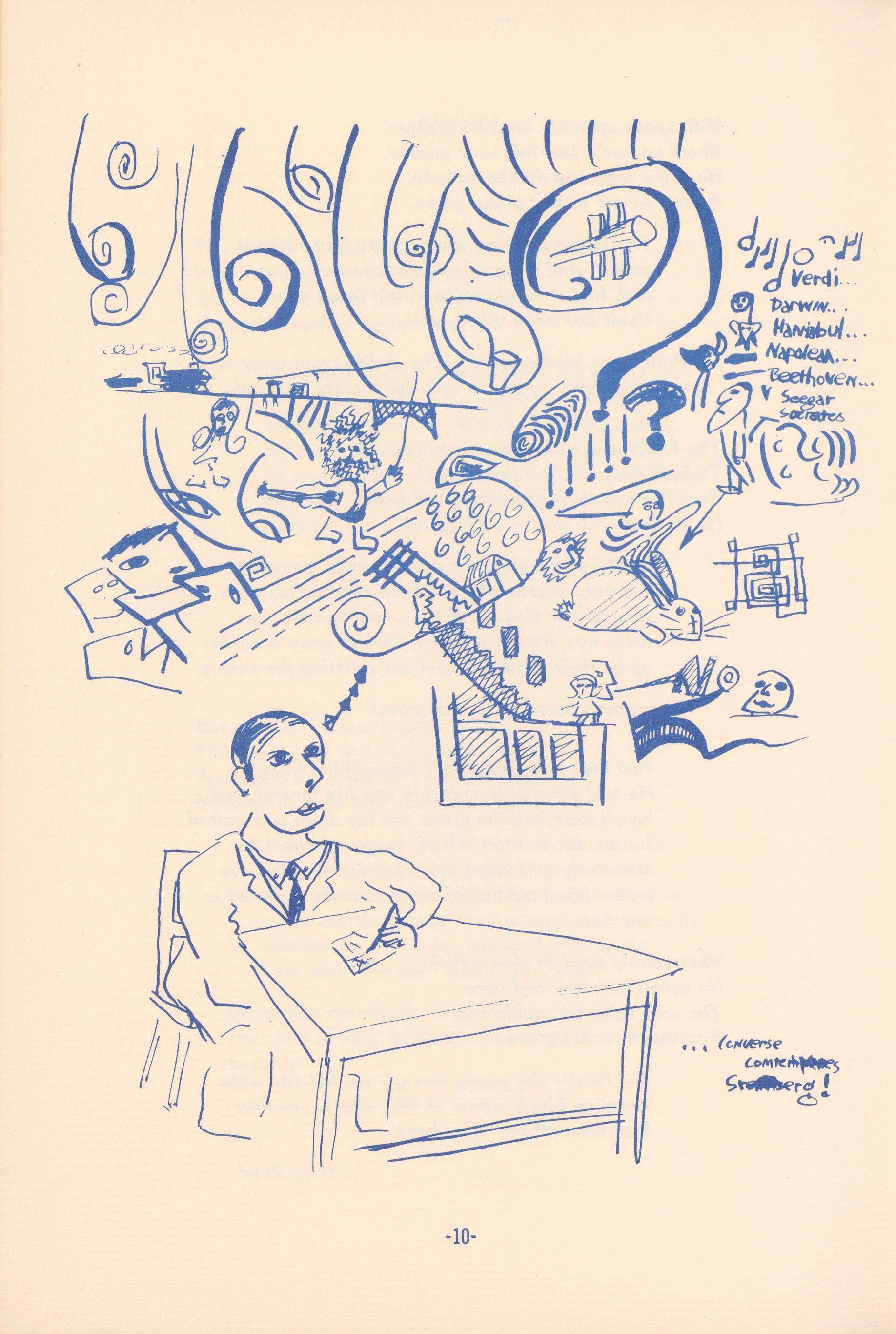

The problem is, of course, more complicated, but what I can tell you right off is that, thinking back, I just can't remember the word that Miss Vurner used. At the time, I wasn't at all ashamed that it wasn't in my vocabulary. I didn't, in fact, pay even enough attention to wonder whether it should be, either just to know or to be employed in my quest to prepare for the shifting future by pinning down the past. But now I am rwnmaging thesaurus and dictionary. Under "flirt" I have located possible synonyms in "soubrette" and "fizgig," knowing that the word was slang because of what she said right after it. I can picture the scene with sharp detail ... how Miss Vurner said that the young lady in question was not ___ whatever the word was that she used -''like so many of them." She was swirling that glass of cloudy scuppernong in the sparkling sun, and her skin, reddened naturally with time and a slight obesity, showed the additional flush that a humid Richmond day inevitably brings. It was just before the cooler time of indian summer, and there was no breeze anywhere.
Though her face showed her sixty years, you could still see steadily darting moods there if you cared to look. She held her head still, elegantly erect as the grand old people do, but a bit too high, as though the pressure of a fleshy neck was pushing it. You had to watch her eyes, and the muscles of her wrinkled face as they played about her mouth. Her lips were sadly dried out, as an old woman's becomes but Miss Vurner's eyes retained a sharp greenness that the sun and her snow white hair intensified, and focused now more intensely on the glass than she had. Her head's position made her eyes slightly bulged as she tried to affect normal horizontal viewing. What name do you use for it now? she asked, in a way that required no answer from me, not having a sufficient demand in its tone, in consideration of my preoocupied mind. That's why I know that the word is slang, and I hadn't really the slightest notion of what we "use now" if an answer had been expected. I'm angry now that I didn't draw her conversation out and discover then all that the word meant to her. I'm not at all sure that "coquette" was the word she had in mind; rem3mbering the scene vividly as I do, I can approximate the word if my ears did not deceive me. But deception was entirely possible, because my teeming mind picks on my hearing as the sense to block when I am preoccupied, and I was that day, by the subject of her comments.
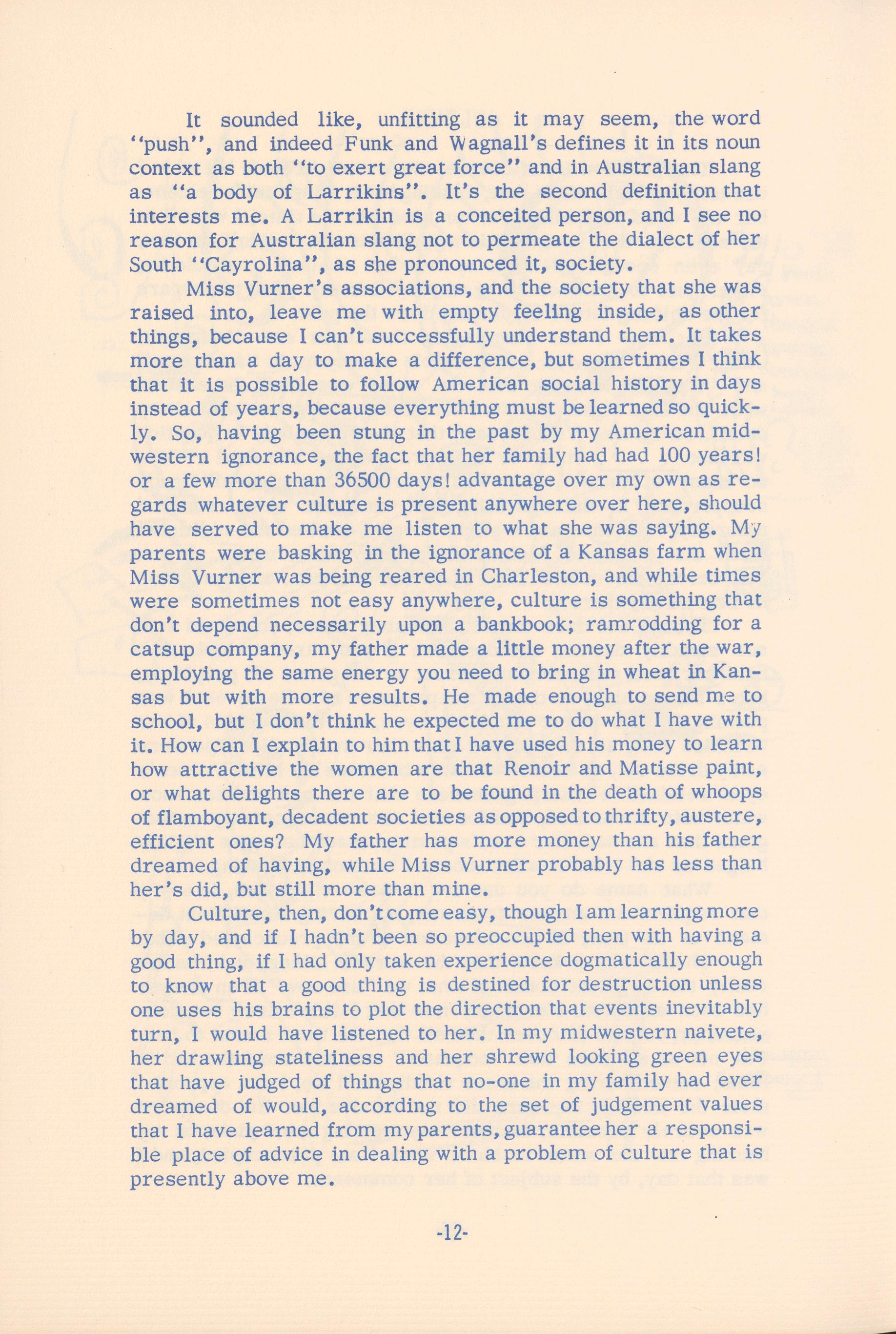
It sounded like, unfitting as it may seem, the word "push", and indeed Funk and Wagnall's defines it in its noun context as both "to exert great force" and in Australian slang as "a body of Larrikins". It's the second definition that interests me. A Larrikin is a conceited person, and I see no reason for Australian slang not to permeate the dialect of her South ''Cayrolina", as she pronounced it, society.
Miss Vurner's associations, and the society that she was raised into, leave me with empty feeling inside, as other things, because I can't successfully understand them. It takes more than a day to make a difference, but sometimes I think that it is possible to follow American social history in days instead of years, because everything must be learned so quickly. So, having been stung in the past by my American midwestern ignorance, the fact that her family had had 100 years! or a few more than 36500 days I advantage over my own as regards whatever culture is present anywhere over here, should have served to make me listen to what she was saying. My parents were basking in the ignorance of a Kansas farm when Miss Vurner was being reared in Charleston, and while times were sometimes not easy anywhere, culture is something that don't depend necessarily upon a bankbook; ramrodding for a cats up company, my father made a little money after the war, employing the same energy you need to bring in wheat in Kansas but with more results. He made enough to send me to school, but I don't think he expected me to do what I have with it. How can I explain to him that I have used his money to learn how attractive the women are that Renoir and Matisse paint, or what delights there are to be found in the death of whoops of flamboyant, decadent societies as opposed to thrifty, austere, efficient ones? My father has more money than his father dreamed of having, while Miss Vurner probably has less than her's did, but still more than mine.
Culture, then, don't come easy, though I am learning more by day, and if I hadn't been so preoccupied then with having a good thing, if I had only taken experience dogmatically enough to know that a good thing is destined for destruction unless one uses his brains to plot the direction that events inevitably turn, I would have listened to her. In my midwestern naivete, her drawling stateliness and her shrewd looking green eyes that have judged of things that no-one in my family had ever dreamed of would, according to the set of judgement values that I have learned from my parents, guarantee her a responsible place of advice in dealing with a problem of culture that is presently above me.

I won't tell you my problem's real name, but call her Michelle, after a popular song. I expected, then, that in her drawling stateliness, Miss Vurner would know more about European women than me. I will not burden you with Michelle's particular nature, for that is the subject of impressions it would take all night for me to describe. Suffice it to say that she is of a higher society than my kind is used to. I don't mean in money alone. I mean in attitude also, in the mood by which she approaches life.
If I could know that word it was that Miss Vurner said Michelle was not, Miss Vurner's choice of that word could be given proper weight in my attempt to define girls of Michelle's type for future reference, a peculiar generalization I am prone to make in my efforts to preserve agreeable characteristics in reality so that when Michell failed me, to which a young man grows cynically . accustomed no matter how attractive he might consider himself, I could go somewhere and find more like her, her loss being unbearable, and be more lucky with my increased knowledge of her ways. My problem is more complicated, for hungry as I am for knowledge, there is the question of what I would do with it. If Miss Vurner said that Michelle was not a girl that throws herself around but rather goes where she want's in a courtly way, I would heartily agree. Yet, if Miss Vurner said that Michelle's morals were not questionable, and that she had not the knack toward the handing of the apple to Adam, I would feel inside that Miss Vurner, for all her greater aquaintance with unfamiliar society, was deluded. I always judged people of Miss Vurner's type as staunchly moral in what I viewed was the old tradition. I became far more the gentleman for her, by what seemed her own standards, than I really am, and I sometimes felt guilty, as in former times I would apologize to my parents for how long the party lasted when the party had been over for hours; and yet I would never feel bad for detaining for so long the girl I had really spent the time with. When Miss Vurner now glanced up at me and said how she would invite Michelle out to meet me, I felt guilty. ''She really seems the proper sort" Miss Vurner emphasized with a wrinkled, melancholy smile, appearing to feel that her word would greet my refined nature as a soothing balm. I appreciate such a smile in someone old. Her kind are never toothless dotages. They are powerful to me, retaining their crust until they are gone instead of folding like a dried leaf. I wouldn't have minded telling her that I knew Michelle already, but I didn't know whether I knew this "proper sort"

Michelle or not. The feeling was of intense but short lived uneasiness. If only it had lasted, I would have been compelled to listen more closely to Miss Vurner's words, but is was too distracted, and the insight that might aid me now was not uncovered. I sometimes go so far on my own as to characterize Michelle's motif as a slowly advancing flood, where her constant, subtle hints leave one breathless in anticipation of the first kiss when all the columned barriers tumble, but further hint that the rest will be downhill. It is like falling in love with a marble statue and then becoming further enraptured for a moment when it becomes flesh and blood.
Needless to say she is gone now, as Miss Vurner is gone, and I am overly romantic in Michelle's description, in view of the loss. Yet, these very emotions that she conveyed to me are the reason why I am now searching for another like her. They were very strange and enjoyable to me. So I am searching, for clues that will help me to uncover a peculiar character, and I have learned that this is more difficult than it may seem, for appearances have a way of deceiving. Yet, as one grows wise I fancy them in possession of a peculiar knack to see under the surface, and this was why I tended to trust Miss Vurner's judgement. I donlt know if Miss Vurner and Michelle even really had social similarities, for their aquaintance in a finishing school was incidental, where Miss Vurner taught Literature to amuse herself while Michelle taught her own language to support herself while she studied life here. Yet, a peculiar look in her eye that day, which I detected even in my distraction, rendered evidence that Miss Vurner felt her judgement fairly enlightened. But, why oh why, then, did she call Michelle the "proper sort." I fear that I have something new and fundamental to learn in my judgement of life, and that if she had known all, Miss Vurner might have still adjudged Michelle to be proper. We said no more about inviting Michelle that day, but even before my present curiosity made me listen only too late, the day was special so that, even though I was paying less attention I remember more. Significance often saturates a memory like a humid Richmond day colors everything about. A native never quite gets used to it himself. I am glad now that I remember it.
Miss Vurner then volunteered to me that day glimpses of her old Charleston days; how her own sister had fermented our Scuppernong wine. She talked steadily of people out of her past, like her sister, identifying them, and subsequently feeling content to use their Christian names without further elaborating. -14-

"Yes" she said, with a sort of girlish thril in her voice. "My sistah made this wine."
"Mary", I said, "How do you evah achieve such exquisite taste?" I wish that, here too, I had drawn her out, to learn what all the names mean in the course of a woman's life such as hers. I wish that my mind had not been fixed on thoughts that would profit me nothing. If I had listened I should perhaps know more that would profit me in my pursuit of happiness, but, distracted by my thoughts, I only heard the unavoidable things that she seemed to volunteer on purpose, for like all of us, she had something inside of her that caused her to say things voluntarily, sometimes spontaineously and other times designed by her system of propriety to cause a listener to ask her more.
''Mary told me that the secret of good Scuppernong is not to age it" Miss Vurner had volunteered. In the same way, I should not have let a past moment age into reverie, but rather made a fresh batch of observations in the present. I should have listened to Miss Vurner instead of dreaming of a scene a day too old for sudden changes of heart. I think now of how quickly Michelle left me when she tired of my momentary charms, with her head held high and the barriers between us as embellished as they were at the start. But I was arrested, then and now, for I don't think I changed Michelle as she changed me. I was arrested, as one is by a single posed scene of a painting, with the image of Michelle finally, clandestinely, and so gracefully, surrendering herself to me. I was captivated with the picture of her closed dark lashes and the olive white color of her skin when passing automobiles flashed in my window. I thought of Michelle leaving, and how ashamed she said she was of herself, and how careful she had been to tuck her

blouse in neatly• and how silently we crept down the plush dark stairs with one arm each resting on the banister and the other tenderly around the other's waist, she dreading discovery. And as I thought, and Miss Vurner spoke, I didn't think to wonder about such things as whether Michelle leaned against me all the way to her own door more out of affection or of the need for support. If I had been steeled to misgivings within the shadow of my triumph, perhaps I would have had the mind to be more conscious of the present as I talked to Miss Vurner.
I hadn't, then, asked Miss Vurner about the Scuppernong as much to make polite conversation as rather because it was in my thoughts. Michelle, too, who considered herself a drinker of only the best wines and seldom consumed any• loved Miss Vurner's Scuppernong, and after Michelle had left my room the night before, I had therefore smiled at the empty stained bottle, which one had contained, in some Charleston repository, the richest of Benedictine Brandy• and now stood empty for the second time in its career. I smiled further at the empty glasses nearby, with the sediment in the bottom that gave off the sweet Scuppernong scent that is a little like model airplane glue. I smiled at all the things that were vital to the evening, as one might do towards his cluttered table when the dinner was so successful that, though the last guest is gone, he suddenly forgets his fatigue. And then my thoughts had turned to Michelle herself and I felt suddenly and pleasantly warm, climbing into bed, laughing at how proud Michelle had been when she realized that she was really drunk •••before she had put her arms around me. When someone does something that is rare for them, you will notice how much pleasure they derive in relating it. Even if itlater becomes a less novel behavior they will still remember the days when it was new and precious as velvet.
Thus, I should have known, if my mind had payed attention to more than the fresh events of the night before, that I had landed on a subject that Miss Vurner wished to elaborate. The urge was so strong in her that she answered questions my preoccupied mind never posed. I could see her eyes focus distantly, beyond the patio, as though she were rendering the hedge invisible and looking beyond the so private and small backyard, into the alley behind.
"I remember the time I fush had moonshine," she said. "I got hold of a friend of mine. 'Birnie!' I said to him, 'I've never tasted moonshine!' "
Miss Vurner poured her cracked brandysnifter full of the sweet wine again, a beautiful crystal vessel despite the

cracked base.
"So we went to the Cayrolina mountains," she said, "and we drove behind an old store and got some moonshine. It was the most beautiful sunset within my memory," she laughed, "and that night I broke my mirror trying to brush my hair, and when we went to the dance, I climbed on a table and did the Charleston."
Miss Vurner laughed and laughed and laughed. I got up and gentlemanly carried the empty bottle to the disposal bin, near the spot where I knew by then she kept the whiskey. I glanced at it idly, the rows and rows of the best bourbon. I could have taken some, but I never did. She had offered me the Scuppernong, but never would she have revealed the slightest evidence that whisky existed in her house •••a funny little feminine conceit of hers. I was constantly amazed by her self control, for it was rare that her actions revealed the she had a crutch, and of course, in those rare times, I would never let on that I could see.
"I think that I'll swim before the sun goes down," she said to me. I knew that this meant I should leave, for she had hinted before that she disliked being seen in her swimming clothes.
"I'll go up to my room and study/' I said. "By the way, here's the rent for last month."
I placed the money by the empty snifter, flat on the table because there was no breeze to stir it. Miss Vurner was mute, her e,yes still distant. As I walked around the pool and entered the cool dark house, I felt guilty again. Even then, but for a different reason, I wished that I had talked to her more. Even then, blind to the necessity of pulling any meaning from life, swimming in the pleasure of one of my momentary, young, triumphs, I felt that l had shown more interest in her conversation, illusionary as it might be to my own way of looking at things, I might relieve a life that I knew was lonely for her. I knew that she had in fact dismissed me that she might have a good, clandestinely drunken, cry. It would have been the gentlemanly thing to do.
I paused suddenly to stare at the portrait of herselfwhen she was young that stood in the hall. Perhaps it was the posture, or the bearing, or even the hairdo, and not the physical characteristics of color and the shape of nose and mouth, but obsessed, out of it, as I was, some similarity that she had to Michelle made my heart race. I climbed the carpeted stairs, entered my room, and took another look at the empty bottle of Scuppernong.
---Montana
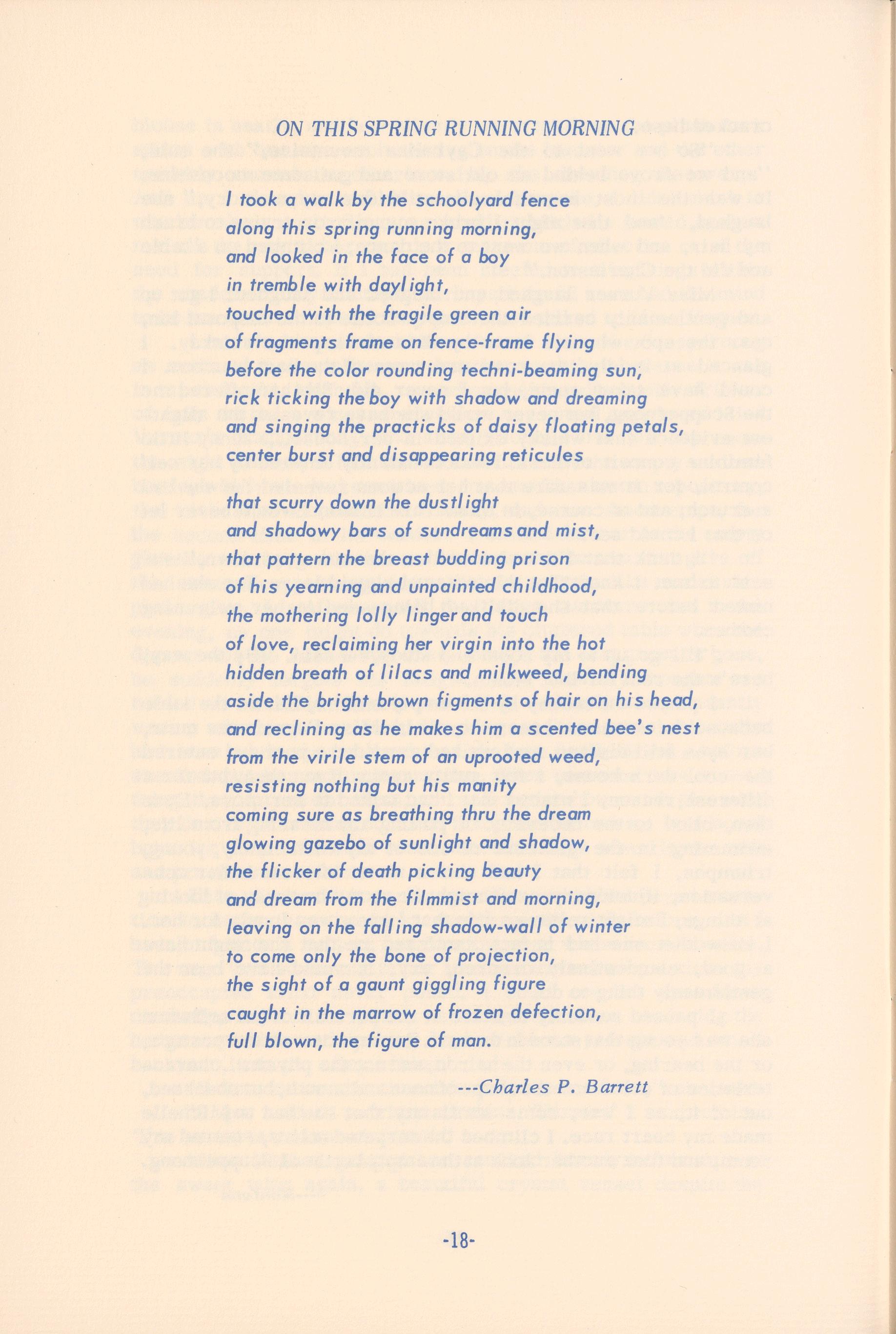
I took a walk by the schoolyard fence along this spring running morning, and looked in the face of a boy in tremble with day/ ight, touched with the fragile green air of fragments frame on fence-frame flying before the color rounding techni-beaming sun, rick ticking the boy with shadow and dreaming and singing the practicks of daisy floating petals, center burst and disappearing reticules
that scurry down the dus ti ight and shadowy bars of sundreams and mist, that pattern the breast budding prison of his yearning and unpainted childhood, the mothering lolly I inger and touch of love, reclaiming her virgin into the hot hidden breath of lilacs and milkweed, bending aside the bright brown figments of hair on his head, and reel ining as he makes him a scented bee's nest from the virile stem of an uprooted weed, resisting nothing but his manity coming sure as breathing thru the dream glowing gazebo of sunlight and shadow, the flicker of death picking beauty and dream from the filmmist and morning, leaving on the falling shadow-wall of winter to come only the bone of projection, the sight of a gaunt giggling figure caught in the marrow of frozen defection, fu/ I blown, the figure of man.
---Charles P. Barrett
L'Artist
That my two transient hands and mortal mind Could at my will create this object that Becomes sufficient to itself, I find Always a mystery to wonder at. Never what I intended it to be, Somehow,with independence of its own, It has become a thing apart from me, That walks away and leaves me here alone To watch it go where I cannot come after. All that I had I gave for its creating; Hy caring and my crying and my laughter; A little while to feel its radiating Brightness kindle inside my heart and shine
In me, which was not meant to remain mine.
---Susan L. Smith
What do you cal I:
The sight of sun-setting cirrus hanging vertically or blowing in the wind,
Of slate set lenses focusing on soul rays,
Of a blush, bunting, often splitting with an ivory stripe;
The sound of a breeze brushing the membrane of a natural organ,
Of crinoline leaves sweeping toward you;
The touch of a feathery gelatine dusting your palms,
Of a warm bundle, form-fitting, full in your arms; The fragrance of a perfume made of floral angelic;
Or the taste of a lollipop, seemingly electrical in your mouth?
What do you cal I them? Cecelia.

-19-
---Timothy A. Miller

Out of the sleeping sieve of ai:- on the morning side of night, the slight leafy trees slowly start to whisper wistful sayings to the breezes swaying with feminine powder and light, stirring the seeds of their whimsical yellow breathing into sailing soft on the volumnes of sky, and they descend in tones as quiet and loud as the color and heat of a hovering humming bird, brushing the ripple of a sperm pigment sun unmixing from the wry and holy nipple of leaves and their long awaking need, aching to the faint ensemble left unpainted below them, and sifting this conception fountain dust with swirls of the lemon hair of a natural angel, touching the earth with wanting, strand on strand like links in the pain of an aphrodaising rain, as awaking the secret touch of alchemy my eyes release of body, the androgeny of love.
---Charles P. Barrett
When still in silent confidence she seeks If, when in seasons gone we will recall The beauties and the pleasures her name speaks The memories that stay, I answer, •All.• I will remember every word that passed The lips I kissed, so tenderly and fair, And all the pain I knew, that when at last I loved her, made my very I ife a prayer. I will remember how I slowly changed With her unknowing presence in my heart. The pleasent fields where all our fancies ranged Became my womb of Manhood, and my start.
And one dark morning hence, I will discover That in my ageless heart I still will love her.
---C. W. Bennett
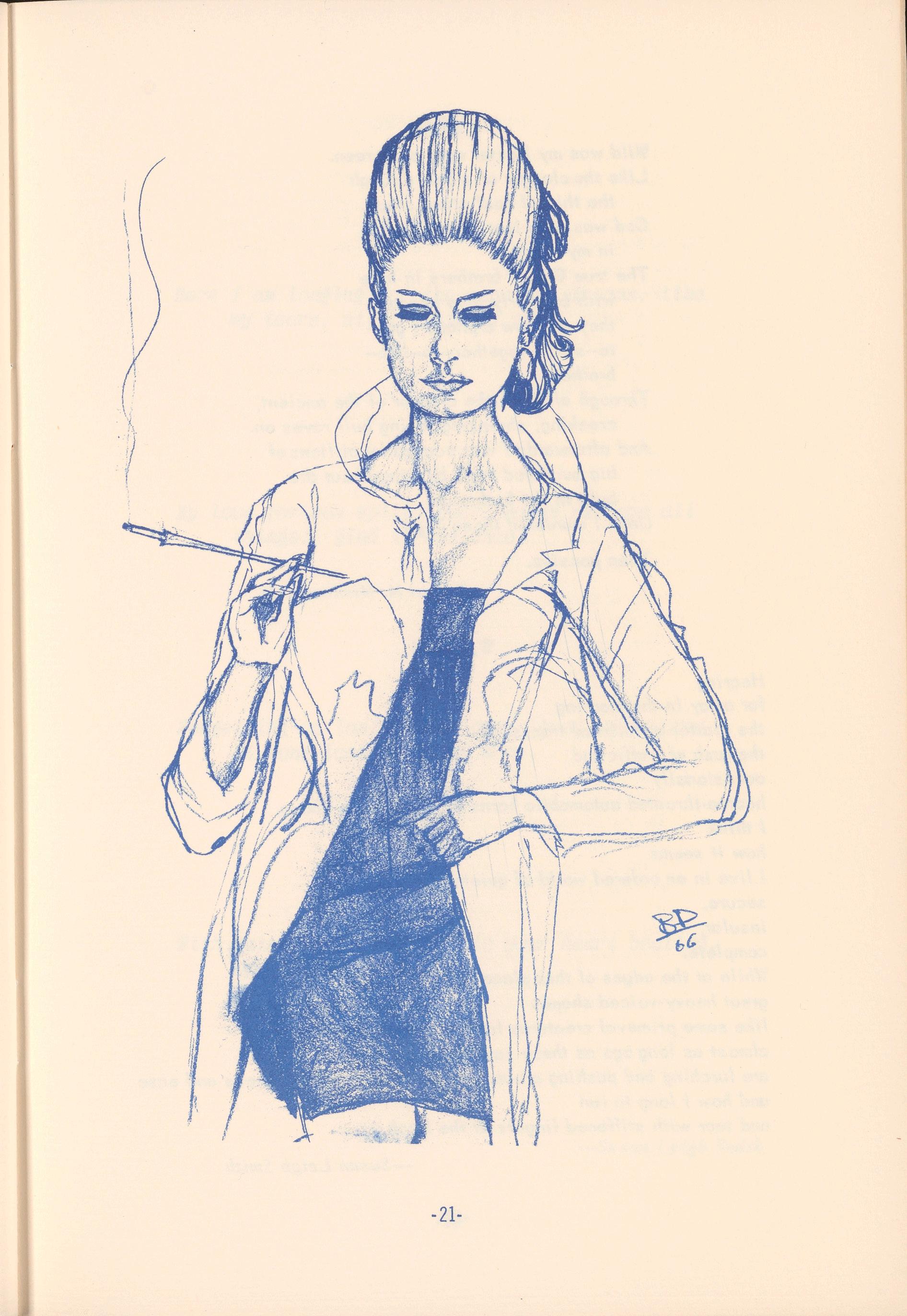
Wild was my Easter egg, and green. Like the clangor of a bell through the thin of cold stone steps. God was born last night--Easter, in my room.
The true God of brothers in love with brotherly love because they are now orphans--got-to--stick--together--in--1 ife-brothers.
Through all this, the clangor of the ancient, creeking, shreeking, dying bell raves on. And afterwards I was bugged by billions of big bug-eyed bugs buzzing about the bulb in the bathroom.
Until I murdered those bugs.
Then pensive.
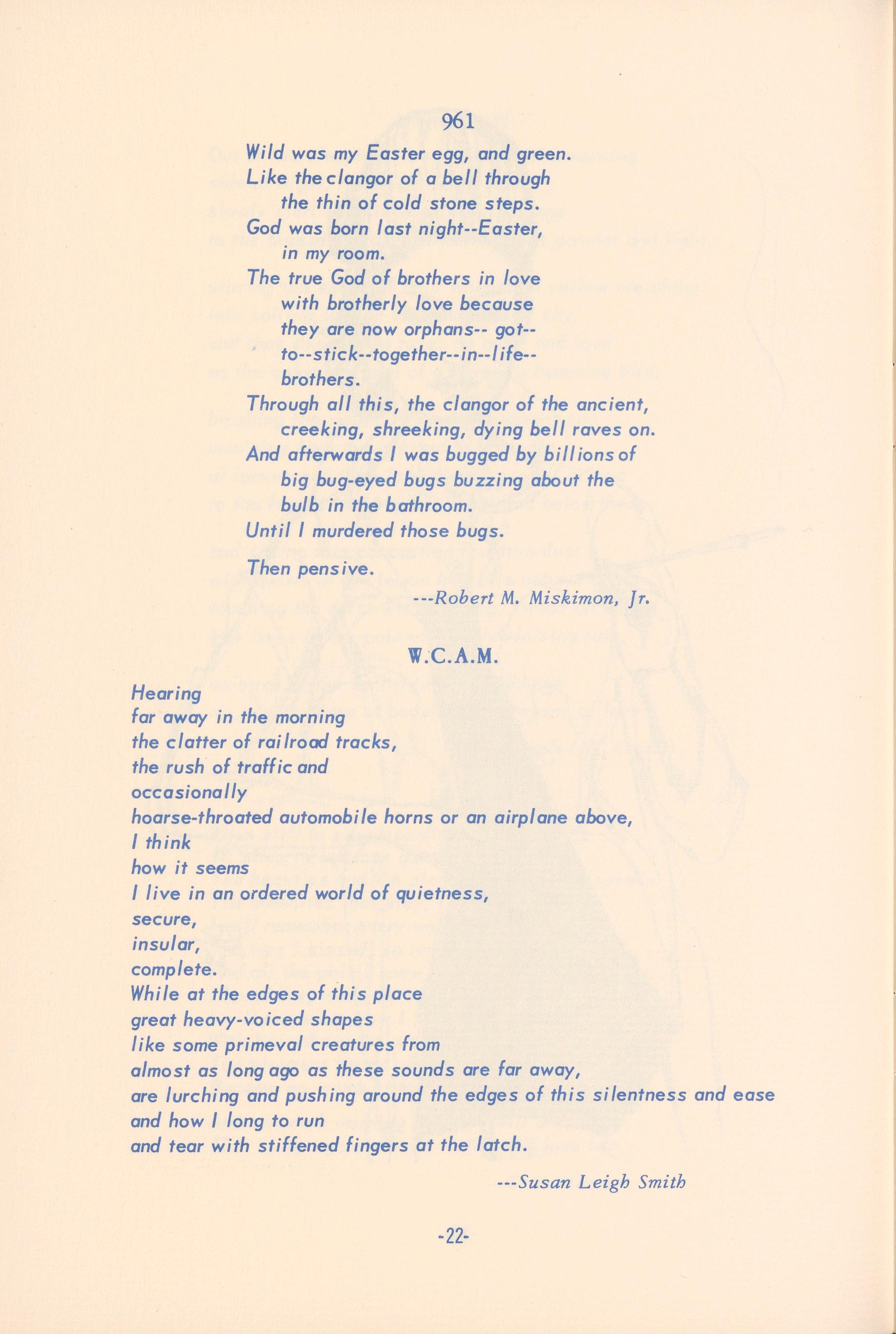
---Robert M. Miskimon, Jr.
far away in the morning the clatter of rai /road tracks, the rush of traffic and occasionally hoarse-throated automobile horns or an airplane above, I think how it seems I live in an ordered world of quietness, secure, insular, complete. While at the edges of ihi s place great heavy-voiced shapes like some primeval creatures from almost as long ago as these sounds are far away, are lurching and pushing around the edges of this silentness and ease and how I long to run and tear with stiffened fingers at the latch.
---Susan Leigh Smith -22-

Here I am longing for the sea; my dreams, like my tears, still taste of salt.
Hy love for you spills over, makes me love all things: glad irrevelance.
Forgetting at last that I once loved, was warm; at long last, cold no more.
With detachment, I listen to your heart beating. G<Xi! Whyam I here?
---Susan Leigh Smith
The field stands likea shadow In the Night.
A layer of moonlight lies caressing all. Two young Seekers
Glide through the gilded grass.
The full, round moon Shimmering in the Vault Fascinates the pair. They ore alone
To stare at the I ight And, as if at a given sign, Both turn to meet The other; Looking, longing in their eyes. In their embrace
The nearness thrills them both. The smooth, brown skin That barely meets, The hint thrice better than the touch.
The Eyes!
So soft and deep and pure, Where in whose depths the Very Soul is seen. And slowly their lips meet: A firm, moist kiss
That shows their love. Her fingers reach, Caress his rumpledhair. His hand moves lightly On her back, The soft; smooth fabric Cool against his palm. He kisses her warm cheek And feels the rich, brown Beauty next to his.
A laughing sigh of love Floats on the breeze
As both come closer to their long-sought peace. Then, hand-in-hand, they turn And run, And leave the moon
To gaze in wonder On their sacred spot.

---C. W. Berznett
Here and there amid tangled vines And sun-hiding trees, peasants, With breeches uprolled and hats of straw, Slosh knee-deep in brown water, As they have for centuries, Urging existence from mud, Each occasionally glancing over his shoulder. Nothing but peasants, sun, and wind-But the peasants-why do they keep Looking, looking back, into emptiness? They wear nothingness on their faces. Peasants remember, not on the surface, But deep within where it is strong. They know back in the emptiness The shadow of impartial death lurks and steals, A hammer in one hand, a sickle in the other, Awaiting a chance to shatter the stillness And pound and rip the peace to shreds. They know at any moment the emptiness May fill up with death And come marching out in ragged column.
---] ames Bowen
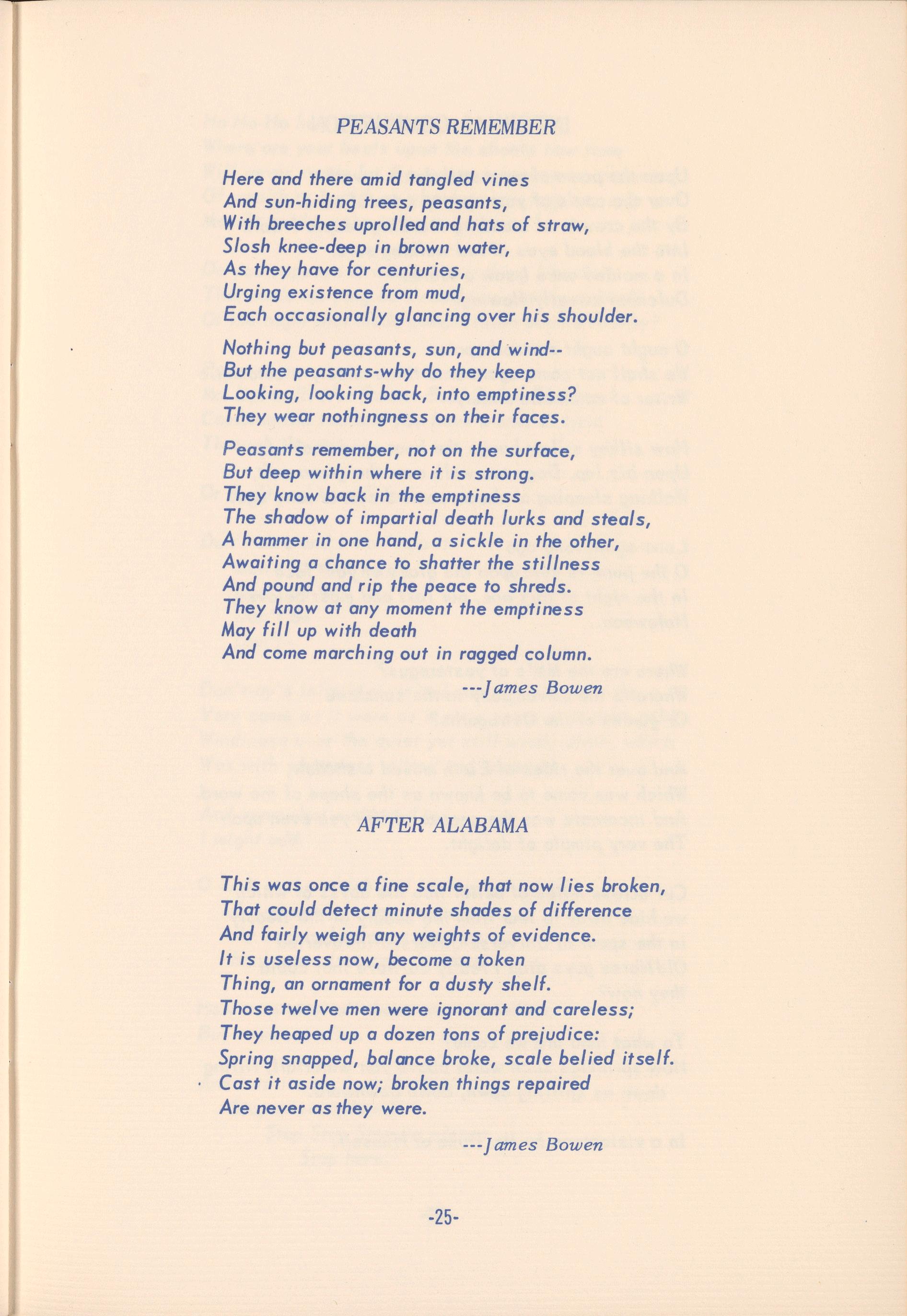
This was once a fine scale, that now I ies broken, That could detect minute shades of difference And fairly weigh any weights of evidence. It is useless now, become a token Thing, an ornament for a dusty shelf. Those twelve men were ignorant and careless; They heaped up a dozen tons of prejudice: Spring snapped, balance broke, scale belied itself. Cast it aside now; broken things repaired Are never as they were.
---] ames Bowen -25-
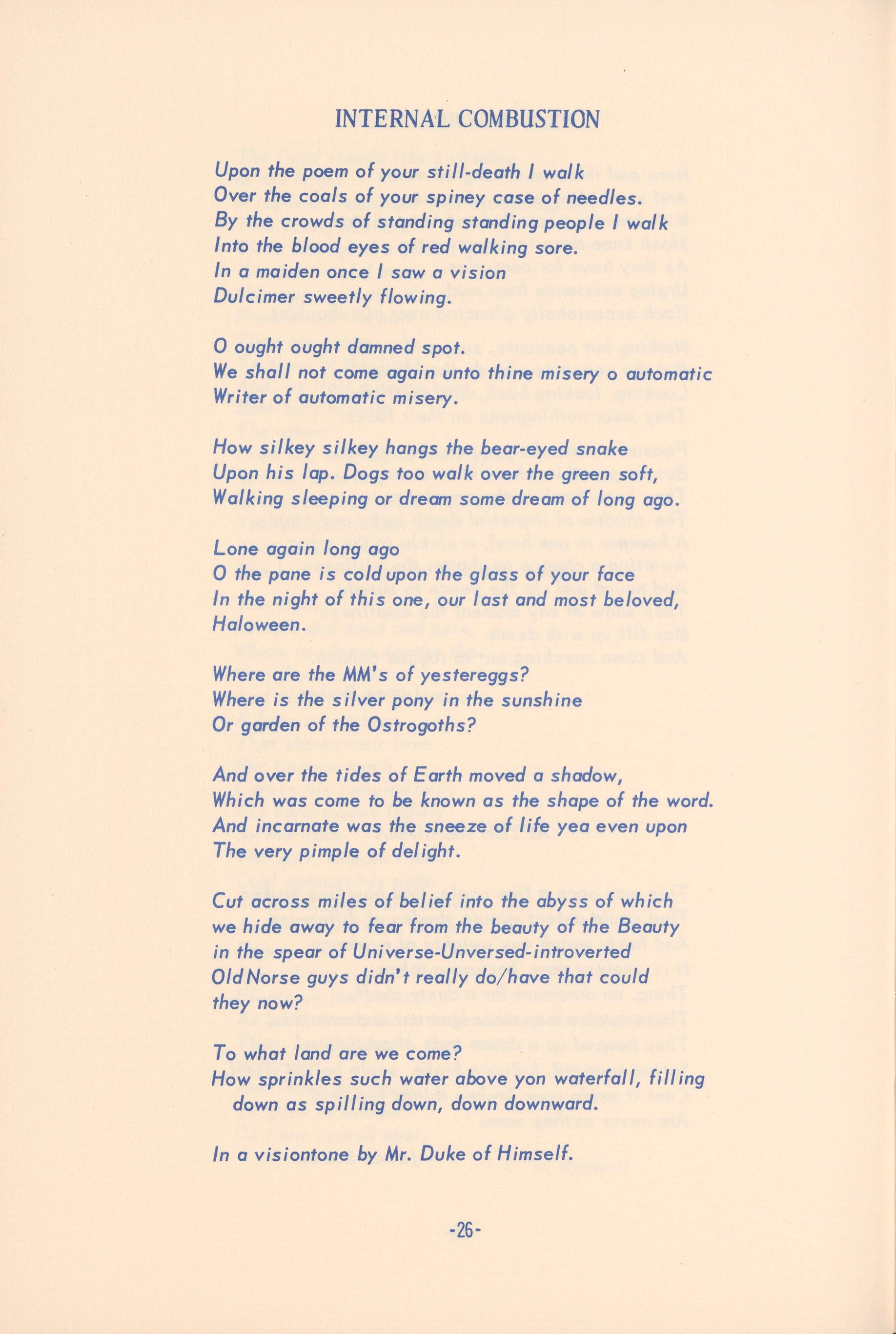
Upon the poem of your still-death I walk Over the coals of your spiney case of needles. By the crowds of standing standing people I walk Into the blood eyes of red walking sore. In a maiden once I saw a vision Dulcimer sweetly flowing.
0 ought ought damned spot. We shall not come again unto thine misery o automatic Writer of automatic misery.
How silkey silkey hangs the bear-eyed snake Upon his lap. Dogs too walk over the green soft, Walking sleeping or dream some dream of long ago.
Lone again long ago 0 the pane is cold upon the glass of your face In the night of this one, our last and most beloved, Haloween.
Where are the MM's of yestereggs? Where is the silver pony in the sunshine Or garden of the Ostrogoths?
And over the tides of Earth moved a shadow, Which was come to be known as the shape of the word. And incarnate was the sneeze of life yea even upon The very pimple of de/ ight.
Cut across miles of belief into the abyss of which we hide away to fear from the beauty of the Beauty in the spear of Universe-Unversed-introverted Old Norse guys didn't really do/have that could they now?
To what land are we come? How sprinkles such water above yon waterfall, filling down as spilling down, down downward.
In a visiontone by Mr. Duke of Himself.
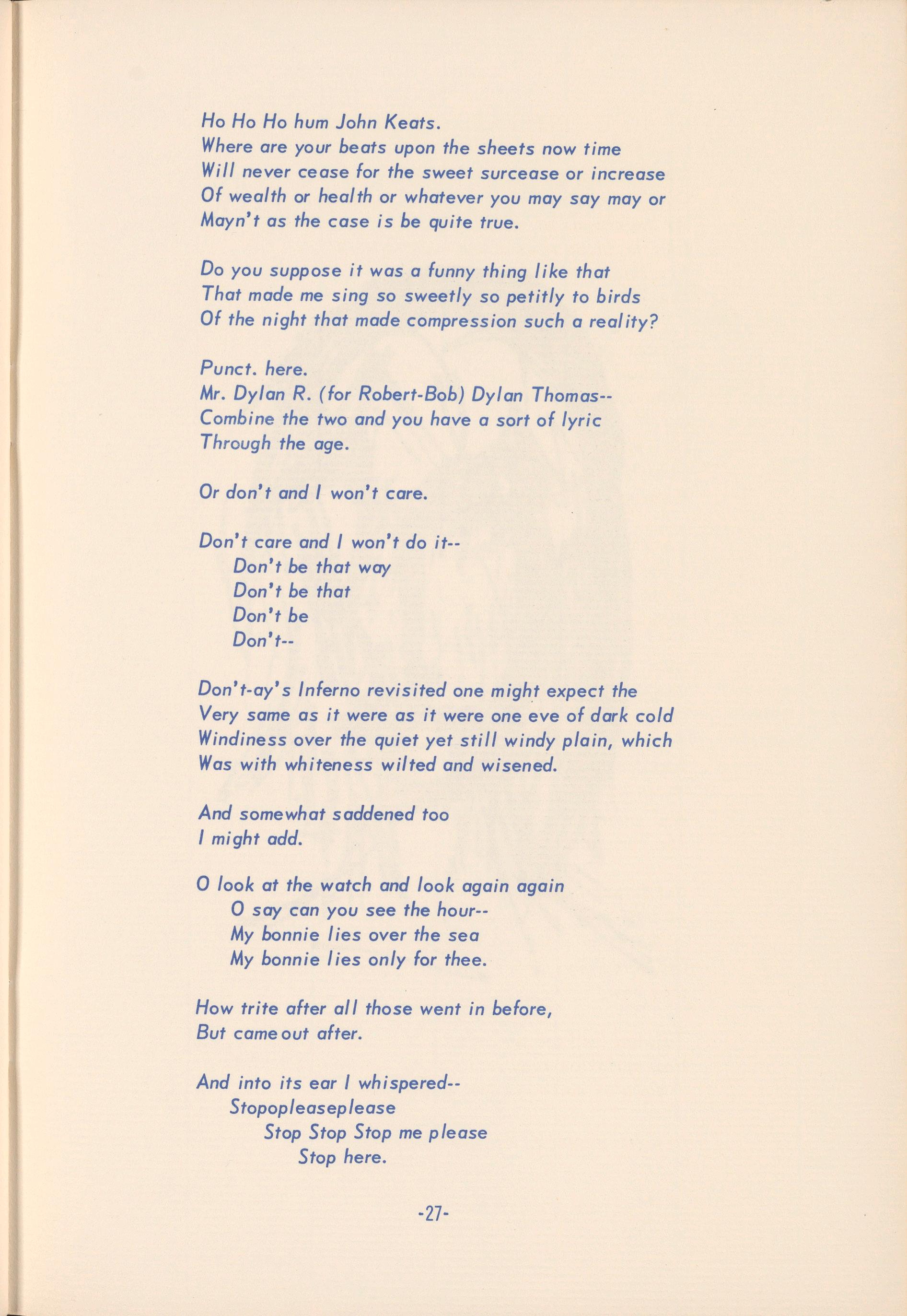
Ho Ho Ho hum John Keats. Where are your beats upon the sheets now time Will never cease for the sweet surcease or increase Of wealth or health or whatever you may say may or Mayn't as the case is be quite true
Do you suppose it was a funny thing like that That made me sing so sweetly so petitly to birds Of the night that made compression such a reality?
Punct. here.
Mr. Dylan R. (for Robert-Bob) Dylan Thomas-Combine the two and you have a sort of lyric Through the age
Or don't and I won't care.
Don't care and I won't do it--
Don't be that way
Don't be that
Don't be
Don't--
Don't-ay's Inferno revisited one migh t expect the Very same as it were as it were one eve of dark cold Windiness over the quiet yet still windy plain, which Was with whiteness wilted and wisened.
And somewhat saddened too I might add.
0 look at the watch and look again again 0 soy can you see the hour-My bonnie I ies over the sea My bonnie I ies only for thee.
How trite after all those went in before, But came out after.
And into its ear I whispered--
Stopopleaseplease
Stop Stop Stop me please Stop here.
-27-
